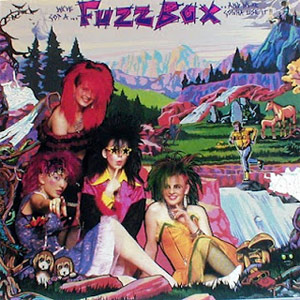
We’ve Got a Fuzzbox and We’re Gonna Use It
Geffen, 1986
As has been expressed a great many times elsewhere, the awesome thing about punk when it came along in the ’70s was its sudden democratization of rock & roll. Rock once again became greasy kids stuff and not just the purview of virtuosos churning out compositions in frocks every bit as frilly as the music they were making. As would be proven in subsequent years, punk was capable of taking itself just as seriously even while, in some instances, subscribing to a dunderheaded ethos, but for the most part the good outweighed the bad on the new level playing field it had created.
One band to take the “anybody can do it” ideology to the nth degree was the Birmingham-born (as in England, not Alabama) We’ve Got a Fuzzbox and We’re Gonna Use It. Where once women had just been used as attractive mouthpieces for songs written and played by studio pros, Fuzzbox decided to do it themselves, even though they could barely play a lick. As such, their moniker was very much a Descartian call-to-arms: we have fuzz and therefore we are. By the ’80s such idealism may have begun to seem naive, but in the face of a resurgence of corporate glossing over of rock & roll, such naivety was abrasively refreshing.
With big, Aqua Netted dayglo hairdos and outfits to match, Fuzzbox weren’t looking to be taken seriously, and their music reflected that. Their self-titled debut (released as Bostin’ Steve Austin in the UK) is comprised of a dozen songs coated in fuzzy, sugary hooks. Any ineptitude is adeptly covered up by the girls’ spunk, but there’s no denying the punch of leadoff track, “Love Is the Slug.” I’d place this song in the upper echelon of the rock & roll cannon in terms of pure appeal. Gang vocals, a big frizzy riff and cracking beats make for bliss in sonic form. (The 12-inch extended version is even better.) The rest of the record utilizes a similar formula, channeling the band’s enthusiasm into songs full of sass and distilled verve. Even their valley girl riffling of “Spirit in the Sky” is full of, er, spirit, if not musical proficiency. “XX Sex” takes the methodology even further, laughing directly in the face of exploitation over a three-chord riff. The closing “Preconceptions” neatly summarizes the band’s position, matching an X-Ray Spex–esque romp to refrains of “pay less attention to the packaging and listen to the voice.”
Sadly, with their next record, Fuzzbox attempted to reinvent themselves as the kind of sexy pop band to which they had once been the antithesis. Not surprisingly, though, that endeavor was unsuccessful. Fortunately that version of the band is largely forgotten, leaving We’ve Got a Fuzzbox and We’re Gonna Use It mostly untainted as an achievement of moxie over matter.
Stephen Slaybaugh
PAST PERFECTS
Opeth, Blackwater Park, Deliverance, Damnation, Lamentations: Live at Shepard Bush Empire 2003
The Trypes, Music for Neighbors
Noh Mercy
fIREHOSE, Lowflows: The Columbia Anthology ('91-'93)
Doug Jerebine, Is Jesse Harper
Poison Idea, Darby Crash Rides Again: The Early Years
Feedtime, The Aberrant Years
Roach Motel, It's Lonely at the Top
Tronics, Love Backed By Force
Archers of Loaf, Vee Vee
Metal Dance
Giant Single: The Profile Records Rap Anthology
Karen Dalton, 1966
Mighty Sparrow, Sparrowmania! Wit, Wisdom and Soul from the King of Calypso 1962-1974
